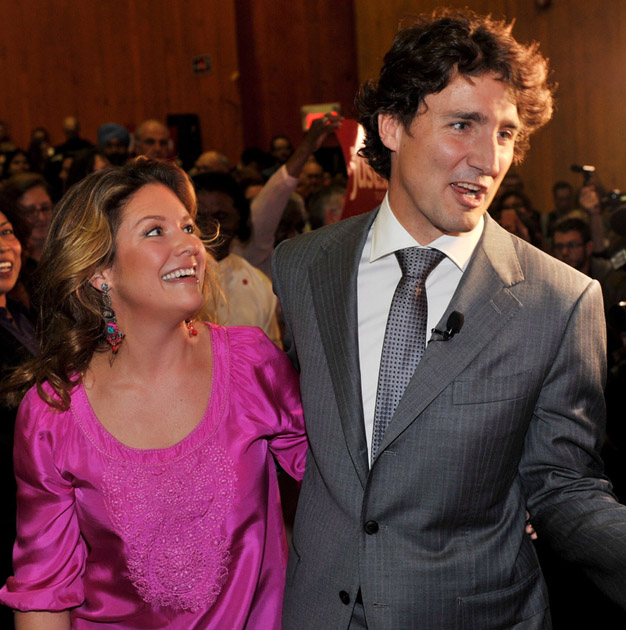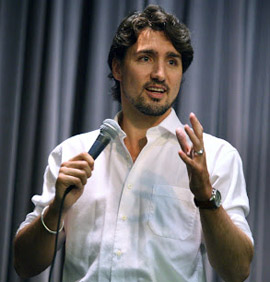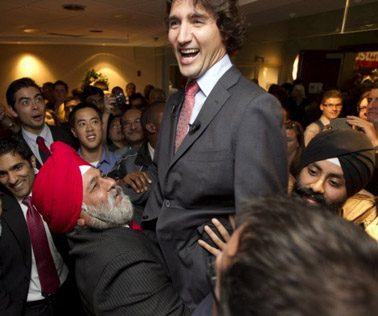Justin Trudeau’s Senate reform surprise .. is this a sign of the new/old kind of federal government he’d lead?
Jan 31st, 2014 | By Citizen X | Category: In Brief Justin “Trudeau’s Senate purge” – of all appointed Liberal senators from the Liberal parliamentary caucus – has been called “a tactical masterstroke,” a “bold move,” “a smart branding strategy,” and a “ push for a non-partisan Red Chamber.”
Justin “Trudeau’s Senate purge” – of all appointed Liberal senators from the Liberal parliamentary caucus – has been called “a tactical masterstroke,” a “bold move,” “a smart branding strategy,” and a “ push for a non-partisan Red Chamber.”
My own assessment is that even the Globe and Mail editorial’s “One cheer for Mr. Trudeau’s Senate surprise” is one too many. The big question it all raises goes something like : Does this send a signal about how a Liberal federal government led by Mr. Trudeau Jr. would govern Canada? And if it does, I am less enthusiastic about the prospect of a new Trudeau Liberal government in Ottawa in October 2015 than I sometimes think I am.
What Justin Trudeau’s Senate reform plans do, it seems to me, is return the debate on the future of the Senate of Canada to some point in the later (or even earlier) 19th century. And, as Mr. Harper has already aptly said (while not actually acting on the concept), the whole problem with the Senate of Canada today is that it is “a relic of the 19th century.”
So, as the Globe and Mail has explained : “Trudeau cuts Liberal senators loose in push for a non-partisan Red Chamber … ‘The Senate must be non-partisan, composed merely of thoughtful individuals … independent from any particular political brand,’ Mr. Trudeau said on Wednesday morning, after expelling the senators from caucus.”
And then, as the editorial in the same learned newspaper has similarly reported, there is a “second plank of Mr. Trudeau’s two-step proposal: His call for future senators to be appointed not by the prime minister, but by some kind of ‘non-partisan appointments process,’ like the one for the ‘Order of Canada recipients.’”
Probably the most distressing thing about all this is how robustly and even aggressively undemocratic it is. It accepts that the Senate of Canada is or at least should be some kind of elitist institution – a chamber of “sober second thought,” meant to moderate the wilder urgings of the popularly elected members of the Canadian House of Commons. This is a view of the purposes of a Senate in Canada that entertains a rather low opinion of what throne speeches and other such documents call “the Canadian people.”
* * * *
 In fact, this is just the theory of the old “Family Compact Tories” from a much earlier 19th century vision of Canadian life, in the old colonial “British North America.” It says something about how our political culture has become so historically crazy, or at least, say, zany, that a reforming Liberal politician of the early 21st century is playing such old (High) Tory tunes – and winning praise from some quarters in the process.
In fact, this is just the theory of the old “Family Compact Tories” from a much earlier 19th century vision of Canadian life, in the old colonial “British North America.” It says something about how our political culture has become so historically crazy, or at least, say, zany, that a reforming Liberal politician of the early 21st century is playing such old (High) Tory tunes – and winning praise from some quarters in the process.
Headlines like “Canadians want an elected Senate, Harper says after Trudeau boots senators,” are equally ironic (and ideologically twisted in terms of earlier debates). These headlines would also be more compelling, if Mr. Harper had not himself appointed so many unelected senators – and/or if he had passed his own “step-by-step“ Senate reform legislation once he’d won his majority government, before asking the Supreme Court for complex constitutional advice..
Similarly, you might think it’s surprising (if not quite zany or especially crazy) that no less a veteran Western Canadian Senate reformer than Preston Manning has called Justin Trudeau’s 19th century Senate reform plan “a step in the right direction.”
The key here, it would appear, is that Western Canadian Senate reform zeal has always wanted to shield the Senator’s pristine regional representation responsibilities from countervailing political party pressures. Thus BC Liberal appointee, Mobina Jaffer, had this to say about Justin Trudeau’s bold new move : “I feel liberated. . . . I’m very excited …Â It means now I can do what I think is correct (and) look after the interests of British Columbians.” Why wasn’t she able to do that as a Liberal caucus member? “Sometimes you listen to your House of Commons colleagues as to how politically it would be better to do A or B.”
 No matter what you do, it seems, Senate reform in Canada all too quickly becomes a surprising, frequently zany, and sometimes even crazy subject. And the really zany thing here is that Preston Manning thinks electing senators would make them more “independent,” and un-tainted by the federal party system. Others would argue that the experience of the more than 100-year-old actual “Triple E” Senate in Canada’s fellow “Westminster” parliamentary democracy of Australia suggests exactly the opposite. (Ie, if you are going to elect senators, the party system is going to become even more involved than it is in Canada’s current appointed Senate – even with Justin Trudeau’s latest alleged “push for a non-partisan Red Chamber.”)
No matter what you do, it seems, Senate reform in Canada all too quickly becomes a surprising, frequently zany, and sometimes even crazy subject. And the really zany thing here is that Preston Manning thinks electing senators would make them more “independent,” and un-tainted by the federal party system. Others would argue that the experience of the more than 100-year-old actual “Triple E” Senate in Canada’s fellow “Westminster” parliamentary democracy of Australia suggests exactly the opposite. (Ie, if you are going to elect senators, the party system is going to become even more involved than it is in Canada’s current appointed Senate – even with Justin Trudeau’s latest alleged “push for a non-partisan Red Chamber.”)
 Anyway, in the end, I suppose I’d still rather see a new/old Justin Trudeau government than an old/new Stephen Harper government in Ottawa. (The British-Canadian-American historian Goldwin Smith’s late 19th century capsule description of this federal capital city – “the last lumber village before the North Pole” – seems especially appropriate this winter season.) But if and when this does happen, I won’t be holding out any big hope that Justin Trudeau will make the kind of big and courageous contribution to the future of Canada that his father finally managed, after many other adventures. Not if what Trudeau the Younger has just done on Senate reform is any indication. And even if something like real Senate reform, in the spirit of the “free and democratic society” alluded to in the Constitution Act, 1982, is just what the modern Canadian people want and need right now.
Anyway, in the end, I suppose I’d still rather see a new/old Justin Trudeau government than an old/new Stephen Harper government in Ottawa. (The British-Canadian-American historian Goldwin Smith’s late 19th century capsule description of this federal capital city – “the last lumber village before the North Pole” – seems especially appropriate this winter season.) But if and when this does happen, I won’t be holding out any big hope that Justin Trudeau will make the kind of big and courageous contribution to the future of Canada that his father finally managed, after many other adventures. Not if what Trudeau the Younger has just done on Senate reform is any indication. And even if something like real Senate reform, in the spirit of the “free and democratic society” alluded to in the Constitution Act, 1982, is just what the modern Canadian people want and need right now.



